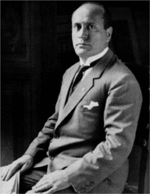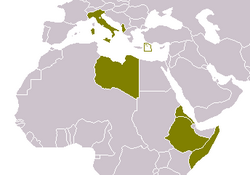Mussolini invades Ethiopia: Difference between revisions
(add reference for Frumentius) |
(No difference)
|
Revision as of 01:25, 9 May 2007
|
In June 1933, William Branham experienced a series of seven prophetic visions. In the first vision, William Branham witnessed Benito Mussolini brutally invading Ethiopia and then himself coming to a shameful demise. This vision has been completely fulfilled. This prophecy seemed out of step with World politics in 1933, as Mussolini had ruled Italy since 1922 with little or isolated opposition, he had signed a concordant with the Catholic Church four years earlier recognizing the Italian State and an independent Vatican, and he had opposed the rise of Hitler in Germany. It was only after Mussolini's crusade in Ethiopia was opposed by the League of Nations that the Italian-German allegiance materialized. Mussolini and his mistress were finally shot by Italian Communists on April 28, 1945, and their bodies were placed on display on meat hooks in the Piazzale Loreto in Milan the next day.
1961 Retelling of the 1933 Prophecy<playmp3>Seventy Weeks of Daniel, August 6, 1961|mussolini 61-0806.mp3</playmp3>
See the sermon Seventy Weeks of Daniel, August 6, 1961 for the full text of this prophecy. Invasion of EthiopiaThe nation of Ethiopia is mentioned a number of times in the Bible. The Queen of Sheba (Ethiopia) met with Solomon c. 950 B.C. (I Kings 10:1), and the treasurer of Ethiopia (a eunuch serving under Candace, Queen of Ethiopia) was baptized by the disciple Philip (Acts 8:27). Frumentius, once a slave in Ethiopia, returned as a missionary and baptized King Ezana, who declared Ethiopia a Christian nation in 340 A.D.[1] Ethiopia developed in relative isolation from European Christianity until 1508 A.D., when Portugal and Ethiopia established diplomatic relations. By 1624 the Portugese influence resulted in the conversion of Emperor Susenyos to Roman Catholicism. However, all Europeans, Jesuits, and Catholic converts were expelled in 1632 by Susenyos' son, Emperor Fasilides, who had read of the Jesuits' bloody inquisitions in other nations. By the late 1880's, many European nations were scrambling to claim portions of Africa as colonies. Italy purchased Eritrea from an Afar Sultan (a vassal of the Ethiopian Empire), which led to various battles between Ethiopia and Italy. Italy also claimed part of the bordering nation of Somalia. In 1896, at the Battle of Adowa, Ethiopia shocked the world by defeating Italy, which resulted in a treaty of peace on October 26, 1896. In September 1934, Italy affirmed its 1928 treaty of friendship with Ethiopia, although the borders between the countries were unclear. At the same time, however, Italian troops began amassing in Italian Somaliland. On October 3, 1935, 100,000 Italian soldiers and a number of Askari attacked Ethiopia from Eritrea and Italian Somaliland without a declaration of war. On October 7, the League of Nations unanimously declared Italy an aggressor but took no effective action. Mussolini is reported as issueing the following commands to his soldiers:
Besides lacing bombs with mustard gas, the Italians instituted forced labor camps, installed public gallows, killed hostages, and mutilated the corpses of their enemies. Captured guerrillas were thrown out of airplanes in mid-flight, and Italian troops photographed themselves next to cadavers hanging from the gallows, and hanging around chests full of detached heads. The war lasted 7 months, with Ethiopia outmatched by Italy in armaments and brutality. The Italian king, Victor Emmanuel III, was proclaimed the new emperor of Italian East Africa on May 9, 1937 (which merged Eritrea, Ethiopia and Somaliland into a single state). The Italians showed favoritism to non-Christian ethnicities (i.e. non-Ethiopian Orthodox and Protestant people) such as the Oromo, Somali, and other Muslims (some of whom had supported the Italian invasion) in an attempt to isolate the Amhara, who had supported Emperor Haile Selassie. With Pope Pius XI silent on Mussolini's unprovoked and terrible conquest of Christian Ethiopia, the bloody Inquisition feared by Emperor Fasilides in 1624 A.D. had finally materialized. On June 30, deposed Ethiopian Haile Selassie made a moving speech before the League of Nations in Geneva in which he set forth two choices--support for collective security or international lawlessness. He warned that "It is us today. It will be you tomorrow". As a result of the League's condemnation of Italy, Mussolini declared the country's withdrawal from the organization. In June 1940 Italy entered World War II on the side of Germany. As a result, Britain sought to cooperate with Ethiopian and other forces in a attempt to dislodge the Italians from Ethiopia and from British Somaliland. Ethiopia was finally liberated from Italian control in East African Campaign in 1941. Mussolini's DemiseOn April 27, 1945, Mussolini and his mistress, Clara Petacci, were caught by Italian communist partisans near the village of Dongo (Lake Como) while attempting to escape into Switzerland before the Allied armies reached Milan. On April 28, Mussolini, his mistress, and their fifteen-man train (mostly ministers and officials of the Italian Social Republic) were taken to the small village of Giulino di Mezzegra, and shot. The next day the bodies of Mussolini and his mistress were found hanging upside down on meat hooks in Piazzale Loreto (Milan). The corpse of the former leader became subject to ridicule and abuse by many. Hence, fulfilling the prophesy of Mussolini coming to a shameful end. References
|









